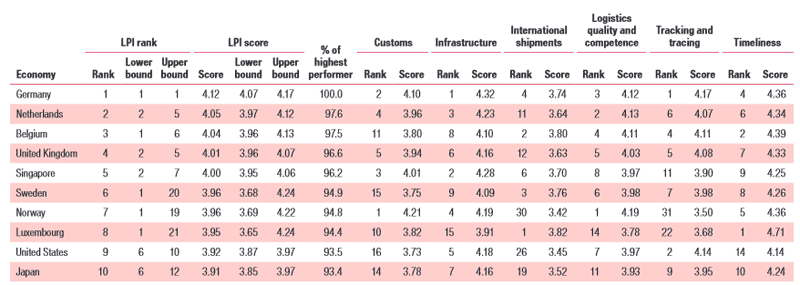From SCDigest's On-Target e-Magazine
- May 20, 2014 -
Global Supply Chain News: Bi-Annual World Bank Logistics Performance Index Places Germany on Top, US at Number 9 Position
Euro Countries Dominate the Top 10; Relative Difficulty Processing International Shipments Keeps US from Moving Up Near Top of Rankings
SCDigest Editorial Staff
For the fourth time, the World Bank has released its report on the logistics competitiveness of countries across the globe.
Connecting to Compete: Trade Logistics in the Global Economy 2014 ranks 160 countries, up from 150 in 2012, across a variety of attributes to calculate a total score, or Logistics Performance Index (LPI). This year, Germany takes the top spot, replacing Singapore, while the US remained at number 9.
SCDigest Says: |
 |
Six countries have been in the top 10 overall for the last three reports: Germany, Netherlands, Belgium, United Kingdom, Singapore and Japan.
|
|
What Do You Say?
|
|
|
|
The results are calculated from survey responses from global freight forwarders, supplemented by interviews with experts on a given country.
The six attributes measured are meant to analyze both international and domestic logistics effectiveness, and are defined below.
• The efficiency of customs and border clearance ("Customs").
• The quality of trade and transport infrastructure ("infrastructure").
• The ease of arranging competitively priced shipments ("Ease of arranging shipments").
• The competence and quality of logistics services - trucking, forwarding, and customs brokerage ("Quality of logistics services").
• The ability to track and trace consignments ("Tracking and tracing")
.
• The frequency with which shipments reach consignees within scheduled or expected delivery times ("Timeliness").
In the end, using some standard statistical methods, every country included in the Index is given a score between 1 and 160 for each attribute, with that score ultimately translated to a number between 0 and 5 (including decimals), which are then averaged to produce a final score.
The graphic below from the report shows the top ten countries for 2014, and the relative rank of each across the six attributes.
Top 10 Countries for LPI with Individual Attribute Scores

Source: World Bank
European countries obviously dominated the top 10, holding the top four spots and 7 of the top 10. Interestingly, for all the hand wringing relative to US logistics infrastructure challenges, the US actually ranked number 5 in the world on that attribute. The US would have been near the top ranking overall except for a relatively poor rank of 26 on ease of international shipments.
(Global Supply Chain Article Continued Below)
|